Posse Comitatus, Habeas Corpus and the Government's Hunt for Terrorists
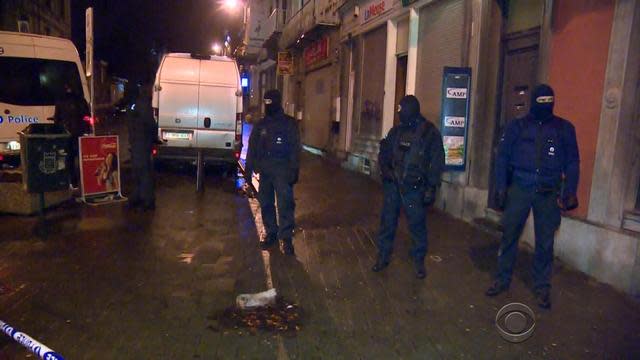
The 130-year-old Posse Comitatus Act in the United States restricts the military’s role in domestic law enforcement, but a 1994 Defense Department Directive allows military commanders to take emergency actions in domestic situations to "save lives, prevent suffering, or mitigate great property damage." [Source]
The John W. Warner Defense Authorization Act of 2007 (PL 109-364) virtually invites the White House to declare federal martial law. It "subverts solid, longstanding Posse Comitatus statutes that limit the military's involvement in law enforcement, thereby making it easier for the President to declare martial law." Section 1031 of the NDAA bill declares the whole of the United States as a “battlefield” and allows American citizens to be arrested on U.S. soil and incarcerated in Guantanamo Bay. Provisions of the NDAA are so radical that they actually remove much of the protections American citizens have had since 1878 under the Posse Comitatus Act and the Non-Detention Act of 1971.
Section 1032 of the NDAA bill puts civilians who would otherwise not be subject to military control into military detention, thus removing the protections of the Posse Comitatus act. Like Section 1031, this would include indefinite imprisonment of civilians apprehended inside of the United States. Section 1032 does not authorize the military to detain civilians without charge or trial -- it, in fact, mandates it. The protection against the government using the military for law enforcement activities within the United States under Posse Comitatus would be eliminated under Section 1032. And the ACLU points out that “all state and federal law enforcement would be preempted by the military.” Previously the state and local law enforcement agencies and the Department of Justice had the primary responsibility to enforce anti-terrorism laws within the United States. The NDAA would, in the case of many civilian suspects, remove federal state and local law enforcement from the process of investigation, arrest, criminal prosecution and imprisonment and hand said powers over to the military.
In December 2011 Infowars received a document originating from Halliburton subsidiary KBR that provides details on a push to outfit FEMA and U.S. Army camps around the United States. Entitled “Project Overview and Anticipated Project Requirements,” the document describes services KBR is looking to farm out to subcontractors. The document was passed on to Infowars by a state government employee who wishes to remain anonymous for obvious reasons. Services up for bid include catering, temporary fencing and barricades, laundry and medical services, power generation, refuse collection, and other services required for temporary “emergency environment” camps located in five regions of the United States. KBR’s call for FEMA camp service bids arrived soon after the Senate overwhelmingly passed the National Defense Authorization Act (NDAA), which permits the military to detain and interrogate supposed domestic terror suspects in violation of the Fourth Amendment and Posse Comitatus.

Latin for "you [should] have the body," habeas corpus is a legal action, or writ, by which those imprisoned unlawfully can seek relief from their imprisonment. Derived from English common law, habeas corpus first appeared in the Magna Carta of 1215 and is the oldest human right in the history of English-speaking civilization. The doctrine of habeas corpus stems from the requirement that a government must either charge a person or let him go free.
“The privilege of the writ of habeas corpus shall not be suspended, unless when in cases of rebellion or invasion the public safety may require it.”—Article I, Section IX of the U.S. Constitution
Habeas corpus, a fundamental tenet of English common law, does not appear anywhere in the Bill of Rights. Its importance was such that it was enshrined in the Constitution itself. And it is of such magnitude that all other rights, including those in the Bill of Rights, are dependent upon it. Without habeas corpus, the significance of all other rights crumbles.
The right of habeas corpus was important to the Framers of the Constitution because they knew from personal experience what it was like to be labeled enemy combatants, imprisoned indefinitely and not given the opportunity to appear before a neutral judge. Believing that such arbitrary imprisonment is “in all ages, the favorite and most formidable instrument of tyranny,” the Founders were all the more determined to protect Americans from such government abuses.
Both the Fifth Amendment and the Fourteenth Amendment to the United States Constitution prohibit governmental deprivations of "life, liberty, or property, without due process of law." The Due Process Clause of the Fourteenth Amendment serves three distinct functions in modern constitutional doctrine: "First, it incorporates [against the States] specific protections defined in the Bill of Rights....Second, it contains a substantive component, sometimes referred to as ‘substantive due process.'...Third, it is a guarantee of fair procedure, sometimes referred to as ‘procedural due process.'..." Daniels v. Williams (1986) (Stevens, J., concurring).

Habeas corpus is an important piece of legislation that should be available in every country. International efforts to establish an international Habeas Corpus court are under way. Today, many democratic countries have the right to petition for habeas corpus. For example, in Australia, the habeas corpus writ originates from the English common law. In Canada, the habeas corpus legal action is also an English law inheritance.
Australia also saw in 2005 some form of habeas corpus suspension when the Australian parliament passed a piece of law called the Australian Anti-Terrorism Act of 2005 that limits the right of habeas corpus for those who are suspected of terrorist activities and arrested on these charges. In Canada, everyone has the right to receive proof for their arrest and contest the decision if evidence is not provided.
Indian judiciary system also uses a doctrine of locus standi, where if a detained person is not in the position to request a habeas corpus petition, a third party can intervene and file the petition in his name. Ireland also grants the right to habeas corpus, but the procedure is not binding during war or in a state of armed rebellion. Malaysia is another example of a country where the right to habeas corpus exists, but it is limited by various internal acts. For example, in Malaysia, the Internal Security Act of 1960 limits habeas corpus by allowing detention without a fair trial for those who are suspected of internal unrest or dangerous activities. In New Zealand, habeas corpus may be petitioned to fight against unfair arrest. The habeas corpus in New Zealand can be used against the government or against private individuals.
All in all, the right for habeas corpus is an important piece of law that gives individuals the power to resist unfair arrest.
European police arrest over 2 dozen in anti-terror sweeps
January 16, 2016Rob Wainwright, head of the police agency Europol, told The Associated Press that foiling terror attacks has become "extremely difficult" because Europe's 2,500-5,000 radicalized Muslim extremists have little command structures and are increasingly sophisticated.
Highlighting those fears, a bomb scare forced Paris to evacuate its busy Gare de l'Est train station during Friday morning rush hour. No bomb was found. A man also briefly took two hostages at a post office northwest of Paris, but police said the hostage-taker had mental issues and no links to terror.
Visiting the tense French capital, U.S. Secretary of State John Kerry met President Francois Hollande and toured the sites of last week's terror attacks: the satirical newspaper Charlie Hebdo and a kosher supermarket. Twenty people, including the three gunmen, were killed.
One of those Paris attackers had proclaimed allegiance to the Islamic State group, and French and German authorities arrested at least 14 other people Friday suspected of links to IS.
Thirteen more people were detained in Belgium and two were arrested in France in a separate anti-terror sweep following a firefight Thursday in the eastern Belgian city of Verviers. Two suspected terrorists were killed and a third wounded in that raid on a suspected terrorist hideout. Federal magistrate Eric Van der Sypt said the suspects were within hours of implementing a plan to kill police, either on the street or in their offices.
In more than a dozen raids Friday, Belgian forces found four military-style weapons including Kalashnikov assault rifles, Van der Sypt said. They also found several police uniforms, which could have allowed the suspects to pass themselves off as police officers.
Belgian officials were reasonably confident they dismantled the core of an important terrorist cell but Van der Sypt said more suspects could be at large.
"I cannot confirm that we arrested everyone in this group," he told reporters.Authorities did not give many details about those detained or killed in Belgium but said most were citizens and some had returned from Syria. They stressed that the targets of their crackdown had no known connections to last week's attacks in France.
French Prime Minister Manuel Valls said Friday that while there was no apparent operational connection between the two terror groups, "the link that exists is the will to attack our values."
Belgium has seen a large number of residents join extremists in Syria.
"It's the worst affected country in Europe relative to population size," said Peter Neumann of the London-based International Center for the Study of Radicalization.He estimates 450 people have left Belgium to fight with Islamic radicals in Syria and that 150 of them have returned home.
Around the world, protesters rallied against Charlie Hebdo in several countries Friday. The satirical newspaper had 12 employees slain for lampooning the Muslim Prophet Muhammad but it defiantly put a new Muhammad cartoon on the cover of its first post-attacks issue this week. The issue sold out its 3 million copies — more than 50 times its usual press run.
In Karachi, Pakistani students clashed with police and an Agence France-Presse photographer was shot and wounded in the melee. In Algeria, demonstrators protesting Charlie Hebdo thronged the streets of Algiers, the capital.
Many Muslims view the caricatures of Muhammad as a profound insult to Islam.
Across Europe, anxiety has grown as the hunt continues for anyone who helped the three Paris gunmen — French police earlier told AP there could be up to six possible accomplices.
The Paris prosecutor's office said at least 12 people were arrested in anti-terrorism raids in the area, targeting people linked to kosher market gunman Amedy Coulibaly, who claimed ties to the Islamic State group. France has put the country on high alert and deployed 122,000 police and troops to protect citizens, especially at Jewish schools and transport hubs.
The Belgian government on Friday decided to start using its army for some public security tasks, part of a 12-point anti-terror plan lawmakers agreed upon in less than 24 hours since the deadly clash Thursday night.
The government will also expand legislation to make traveling abroad with a terror goal a crime and allowing authorities to withdraw ID from people suspected of traveling to such areas.
In Berlin, police arrested two men Friday morning on suspicion of recruiting fighters for the Islamic State group in Syria. Prosecutors said 250 police officers raided 11 residences at dawn, part of a months-old investigation into Turkish extremists.
Kerry's visit to France came after the Obama administration apologized for not sending a higher-level delegation to Sunday's massive rally in Paris, which drew more than 1 million people to denounce terrorism. Hollande thanked Kerry for offering support.
"You've been victims yourselves of an exceptional terrorist attack on Sept. 11. You know what it means for a country," Hollande said. "Together, we must find appropriate responses."
Belgian authorities are separately looking for possible links between a man they arrested in the southern city of Charleroi for illegal trade in weapons and Coulibaly.
Several other countries are also involved in the hunt for possible accomplices to Coulibaly and the gunmen who attacked the newspaper, brothers Cherif and Said Kouachi.
A senior Iraqi intelligence official told the AP on Friday that Iraqi intelligence officers warned their French counterparts two months ago that a group linked to Khorasan in Syria was plotting an attack in Paris. The official spoke anonymously because he was not authorized to brief media.
Related:
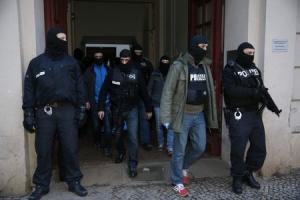
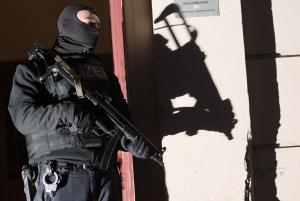
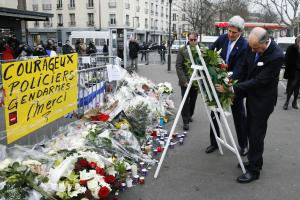
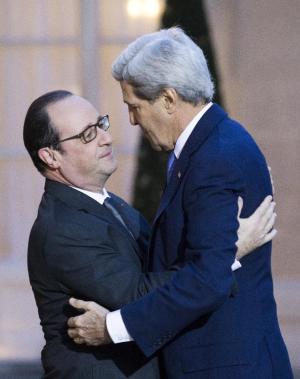




No comments:
Post a Comment